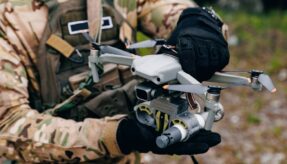
The US Air Force Research Laboratory is investing in a ‘Digital Hangar’ containing surrogates of aerospace systems to improve their digital lifecycle.
The ‘Digital Hangar’ from the US Air Force Research Laboratory (AFRL) is a new concept that stores copies of systems to improve their digital lifecycle. The virtual repository stores securely gated copies of aerospace systems that are part of new goals to research and identify high-value data.
The systems are protected by a secure verification and validation process. One initiative is to produce digital artefacts for aerospace that can be shared with other AFRL researchers, Air Force Service Programs, and agencies such as NASA.
Dr Rick Graves, AFRL design and analysis branch aerospace research engineer, said: “It’s a lot cheaper to address problems or to look at physics-based questions through simulation as a project moves up the scale to ground testing or even a flight test, where it becomes more and more expensive.”
“We want to know what types of information we should be generating and using to make decisions during early design phases because that’s where a lot of the costs for an aircraft get locked in. We want to know what types of information we should be gathering over the life cycle of the airplane. The idea is to identify what data is worth keeping, and reuse that data, to look at preliminary concepts in terms of transitioning technology is something we really like to look at as early as we can. This helps us transition our technology more efficiently.”
The Digital Hangar forms part of the Department of Defense Digital Engineering Initiative which develops how the DOD operate and sustain systems. The strategy will continue to develop the hangar to eventually store design data for Air Force systems to help inform decision making in the AFRL and other organisations within the sector.
If you would like to join our community and read more articles like this then please click here.
aerospace AFRL digital Innovation Secure systems US Air Force








